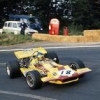Read in another thread a lot of opinions on Johnny Dumfries, Senna's teammate at JPS Lotus in 1986.
This set me thinking about the team-mates of the "greats" and how much competition they provided (assuming they were allowed to, or given the tools to do so) to the No 1 driver.
A lot has been written on how Senna and Schumacher controlled, or tried to control, their teams completely, with a final say on the choice of no 2 driver etc. etc.
Prost's acceptance of whoever was in the other car is often held up as the shining example of how to do it; which appears fair. The very fact that he accepted Senna coming into the McLaren team speaks for him even though many regard him no better than Senna.
Whereas Senna and, particularly, Scumacher are clearly guilty of this, I believe that people tend to overlook others who have been at the very least as bad in requiring the total focus of their teams on themselves - and who have never stopped being political about everything.
Just consider Lauda, Jones, Mansell and J. Villeneuve.
Against whom I nominate "nice guys" like Peterson, Andretti, Reutemann, Patrese, G. Villeneuve, Berger and Alesi. All of whom have accepted equal No 1 (or less) status in their teams.

Team mates ?
Started by
Mohican
, Nov 07 2001 11:21
7 replies to this topic
#1

Posted 07 November 2001 - 11:21
Advertisement
#2

Posted 07 November 2001 - 11:31
Well, looks like Prost didn't want Senna to join Williams in 93. Maybe in 88 McLaren wouldn't have got the Honda engines, without Senna joining? Anyways, it's no big deal IMHO.
#3

Posted 07 November 2001 - 11:33
Johnny Dumfries became Senna's teammate in '86 after Senna refused Derek Warwick as his teammate. Lotus wanted Warwick, who was without a team after Renault quit at the end of '85, but Senna was scared of him. Warwick was considered as one of the fastest drivers in those days. Derek was finally left without a team but took over Elio de Angelis' seat in the Brabham after Elio's fatal crash at Le Castellet.
#4

Posted 07 November 2001 - 11:34
One thing that is worth bearing in mind about Senna's refusal to let Warwick join Lotus in 1986 is that he has always said that it was not that he feared the competition from Warwick (after all, if he feared that then he would have been unlikely to have been willing to join Prost at McLaren in 1988), but that he feared that Lotus did not have the resources to run a competitive team with two number one drivers.
There may well be some truth in this, as Lotus seemed to go into a fairly rapid decline once Senna left. Despite access to the best engines in 1988, and reigning world champion Nelson Piquet at the wheel, Lotus failed to achieve much that year. From then on it was down hill all the way. Arguably the team never really recovered from the death of Colin Chapman. Their decline was masked for a while by the best efforts of Senna, but once he was gone Lotus' long slide into oblivion was assured.
Its worth noting that when Senna moved to Lotus from Toleman in 1985, he remarked that he "now had a car in which I can win races, but maybe not the world championship".
You are right to note that Senna and Schumacher are far from the only drivers to interfere in the running of their team. Lauda was always fussy about that kind of thing, as was Jones. Mansell's absurd histrionics in the early nineties over who his team mate would be at Williams can probably be put down to the fact that Mansell had already been partnered by Prost once, and had been comprehensively outpaced by the Frenchman.
Prost himself, of course, tried to veto Senna's attempts to join Williams in 1993 and 1994, finally deciding that retirement was in any case the better option.
Of the drivers you list who were never fussy about who their team mates were, it is perhaps worth noting that Alesi, Berger and Patrese, at any rate, were not really true number one drivers, and therefore simply weren't able to have as much influence over their respective teams.
There may well be some truth in this, as Lotus seemed to go into a fairly rapid decline once Senna left. Despite access to the best engines in 1988, and reigning world champion Nelson Piquet at the wheel, Lotus failed to achieve much that year. From then on it was down hill all the way. Arguably the team never really recovered from the death of Colin Chapman. Their decline was masked for a while by the best efforts of Senna, but once he was gone Lotus' long slide into oblivion was assured.
Its worth noting that when Senna moved to Lotus from Toleman in 1985, he remarked that he "now had a car in which I can win races, but maybe not the world championship".
You are right to note that Senna and Schumacher are far from the only drivers to interfere in the running of their team. Lauda was always fussy about that kind of thing, as was Jones. Mansell's absurd histrionics in the early nineties over who his team mate would be at Williams can probably be put down to the fact that Mansell had already been partnered by Prost once, and had been comprehensively outpaced by the Frenchman.
Prost himself, of course, tried to veto Senna's attempts to join Williams in 1993 and 1994, finally deciding that retirement was in any case the better option.
Of the drivers you list who were never fussy about who their team mates were, it is perhaps worth noting that Alesi, Berger and Patrese, at any rate, were not really true number one drivers, and therefore simply weren't able to have as much influence over their respective teams.
#5

Posted 07 November 2001 - 14:09
Hopefully we can agree to have different opinions about Alesi, Berger and Patrese's relative worth and their status in their teams.
To my mind they have all been clear team leaders at least once; Alesi with Ferrari ('92), Berger with Benetton ('86) and Patrese with Arrows ('78-81). By this I am not saying that they were ever in the Prost/Senna class, and equally it is clear that when they were not necessarily no 1 in these or other teams, at other stages of their career.
As an aside, though, I think that Alesi/Berger at Ferrari/Benetton in '93-97 appeared more equally balanced - in terms of competitiveness, results and rapport with their teams - than for instance Hakkinen/Coulthard at McLaren in '96-'01. Where Hakkinen was always - rightly, in my view - the no 1, regardless of what McLaren said officially.
My original point was actually to try to defuse the, mainly British, obsession with Senna/Warwick and Prost/Mansell. Let's face it: Warwick and Mansell were solid professionals, no more. They clearly had great personal courage and driving skill, but these should be givens at this level - but Mansell lucked into his world championship by having a greater car advantage than anyone else. that he then destroyed his own standing within his team at the same time as he won the championship says it all.
Quite apart from everything else, surely Berger holds the record for being no 1 or joint 1 for the longest period ? Benetton '86, Ferrari '87-89, McLaren '90-92 (a weaker case, admittedly), Ferrari '93-95 and finally Benetton '96-97. A great record.
And no, I am not Austrian; and I do not like Lauda, I admit.
There have been other champions with a clear car advantage; just think Farina ('50), Ascari ('52-53), Fangio ('51 and '55), Hill ('61), Clark ('63), Lauda ('75 and '84), Andretti ('78), Senna ('88), Hill ('96) and Schumacher ('01). However, most of them had clear competition from their own team mates. These team mates sometimes had to toe the line (just think '78) but at least they were not only allowed to be compete, they were capable of it as well.
To my mind they have all been clear team leaders at least once; Alesi with Ferrari ('92), Berger with Benetton ('86) and Patrese with Arrows ('78-81). By this I am not saying that they were ever in the Prost/Senna class, and equally it is clear that when they were not necessarily no 1 in these or other teams, at other stages of their career.
As an aside, though, I think that Alesi/Berger at Ferrari/Benetton in '93-97 appeared more equally balanced - in terms of competitiveness, results and rapport with their teams - than for instance Hakkinen/Coulthard at McLaren in '96-'01. Where Hakkinen was always - rightly, in my view - the no 1, regardless of what McLaren said officially.
My original point was actually to try to defuse the, mainly British, obsession with Senna/Warwick and Prost/Mansell. Let's face it: Warwick and Mansell were solid professionals, no more. They clearly had great personal courage and driving skill, but these should be givens at this level - but Mansell lucked into his world championship by having a greater car advantage than anyone else. that he then destroyed his own standing within his team at the same time as he won the championship says it all.
Quite apart from everything else, surely Berger holds the record for being no 1 or joint 1 for the longest period ? Benetton '86, Ferrari '87-89, McLaren '90-92 (a weaker case, admittedly), Ferrari '93-95 and finally Benetton '96-97. A great record.
And no, I am not Austrian; and I do not like Lauda, I admit.
There have been other champions with a clear car advantage; just think Farina ('50), Ascari ('52-53), Fangio ('51 and '55), Hill ('61), Clark ('63), Lauda ('75 and '84), Andretti ('78), Senna ('88), Hill ('96) and Schumacher ('01). However, most of them had clear competition from their own team mates. These team mates sometimes had to toe the line (just think '78) but at least they were not only allowed to be compete, they were capable of it as well.
#6

Posted 07 November 2001 - 23:02
Fangio had a clear car advantage in 1951?
And didn't Schechter have a dominant car in '79, with a dutiful Gilles Villeneuve in tow?
The inability of Lotus to field two strong finishers seems to have been a 'day one deviation' and part of the Chapman days.
And didn't Schechter have a dominant car in '79, with a dutiful Gilles Villeneuve in tow?
The inability of Lotus to field two strong finishers seems to have been a 'day one deviation' and part of the Chapman days.
#7

Posted 08 November 2001 - 01:08
I would'nt have thought Berger was No. 1 at Benneton in 86, was'nt Fabi more experienced at the time? When Berger originally signed for Ferrari in 93, he was supposed to be the No. 1, but changed it to be equal, because Alesi whined a bit, and Berger thought it was not good for team atmosphere. That's the gist I get from Hilton's book on Berger anyway.
#8

Posted 14 November 2001 - 09:22
Come to think of it, my previous point about Berger's longevity as no 1 or equal No 1 driver applies equally well to Alesi:
'92 no 1 Ferrari
'93-'95 equal no 1 Ferrari
'96-'97 equal no 1 Benetton
'98-'99 no 1 Sauber
'00-'01 no 1 Prost
The difference being that the Sauber and Prost teams were not that good...
'92 no 1 Ferrari
'93-'95 equal no 1 Ferrari
'96-'97 equal no 1 Benetton
'98-'99 no 1 Sauber
'00-'01 no 1 Prost
The difference being that the Sauber and Prost teams were not that good...













